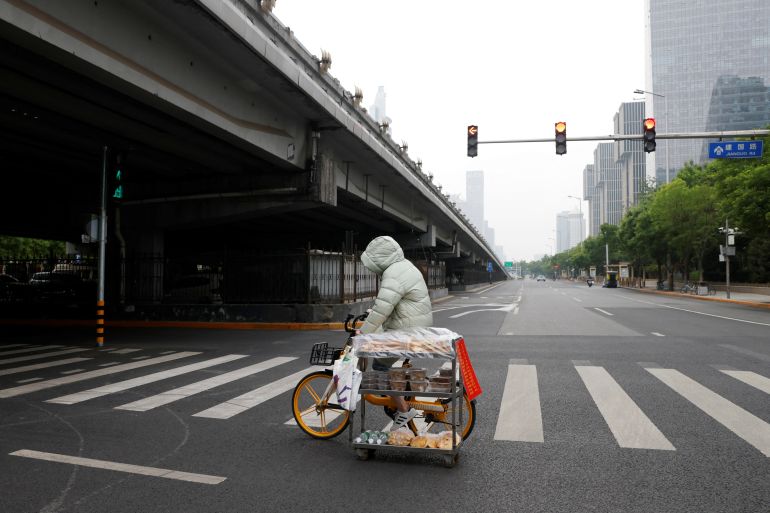WHO says China’s zero-COVID strategy unsustainable
UN health agency officials say that any measure to tackle a coronavirus outbreak should show respect for human rights.

China’s zero-COVID strategy to defeat the pandemic is not sustainable, the head of the World Health Organization has said, in a rare public criticism by the UN agency on a government’s handling of the coronavirus.
Draconian measures have trapped most of Shanghai’s 25 million people at home for weeks as China tries to stamp out the country’s worst outbreak since the pandemic began.
Keep reading
list of 4 itemsMass testing and lockdowns: Inside China’s ‘zero COVID’ policy
China’s April exports slow amid tightening COVID curbs
What’s the true toll of COVID-19?
Yet the Shanghai lockdown has intensified, causing outrage and rare protest in the last major country still pursuing a zero-COVID policy.
“When we talk about the zero-COVID strategy, we don’t think that it’s sustainable, considering the behaviour of the virus now and what we anticipate in the future,” Tedros Adhanom Ghebreyesus told a news conference on Tuesday.
“We have discussed about this issue with Chinese experts and we indicated that the approach will not be sustainable … I think a shift would be very important.”
The UN shared the comments in Chinese on the social media platforms Weibo and WeChat, but the Weibo post was deleted and the WeChat sharing function for the post disabled, according to Reuters news agency.
Shanghai remains the epicentre of the latest outbreak, but people in dozens of cities are going through some form of lockdown, including in the capital Beijing, which reported a total of 37 cases of the virus on May 10.
Al Jazeera’s Katrina Yu lives in an eastern district of Beijing where there have been restrictions for the past 2-3 weeks. People are being encouraged to work from home, and tested every second day for COVID-19.
“It goes to show how the authorities here are scrambling to do whatever they can to avoid a citywide lockdown” she said.
WHO emergencies director Michael Ryan said it was time for China reconsider its approach, saying any measures to combat the COVID-19 pandemic should show “due respect to individual and human rights”.
“We need to balance the control measures against the impact on society, the impact they have on the economy, and that’s not always an easy calibration,” he said.
Ryan noted that China had registered 15,000 deaths since the virus first emerged in its central city of Wuhan in late 2019 – a relatively low number compared with nearly a million in the United States and more than half a million in India.
China responded to that initial outbreak with a draconian months-long lockdown, but after the lifting of restrictions life returned mostly to normal apart from restrictions at the border.
Last week, President Xi Jinping reiterated China’s commitment to zero-COVID and warned critics would be punished.
Maria Van Kerkhove, the WHO’s technical lead on COVID-19, said that worldwide it was impossible to stop all transmission of the virus.
“Our goal, at a global level, is not to find all cases and stop all transmissions. It’s really not possible at this present time,” she said.
“But what we need to do is drive transmission down because the virus is circulating at such an intense level.”